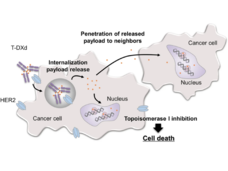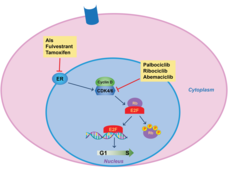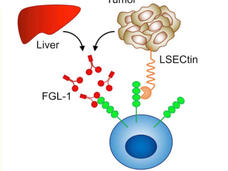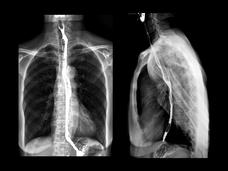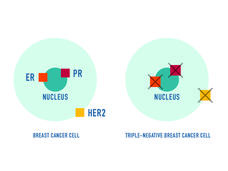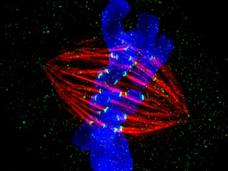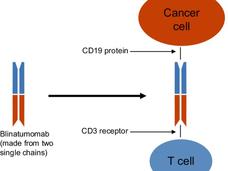Clinical Trial Results - Cancer Currents Blog
Reports on findings from cancer clinical trials, with commentary from leading researchers on how the trial results will affect patient care.
-
Immunotherapy Combination Most Effective as Initial Treatment for BRAF+ Melanoma
Clinical trial finds that ipilimumab (Yervoy) and nivolumab (Opdivo) combo is superior to a combination of the targeted therapies dabrafenib (Tafinlar) and trametinib (Mekinist) as the first treatment for metastatic BRAF-positive melanoma.
-
For Older Adults, Geriatric Assessment Reduces Cancer Treatment Side Effects
For older adults with advanced cancer, a geriatric assessment can help direct their treatment, a new study shows. In the study, patients whose care was guided by a geriatric assessment experienced fewer serious side effects and falls in their homes.
-
Shorter, More Intensive Radiation Safe after Surgery for Prostate Cancer
Many with prostate cancer can safely receive shorter, higher-dose radiation therapy after surgery, a new study has found. The approach, called HYPORT, didn’t harm patients’ quality of life compared with the standard radiation approach, trial finds.
-
Adjuvant Immunotherapy Approved for Some Patients with Lung Cancer
Atezolizumab (Tecentriq) is now the first immunotherapy approved by FDA for use as an additional, or adjuvant, treatment for some patients with non-small cell lung cancer. The approval was based on results of a clinical trial called IMpower010.
-
Enhertu May Be Preferred Therapy for Some Metastatic Breast Cancers
In people with metastatic HER2-positive breast cancer, the targeted drug trastuzumab deruxtecan (Enhertu) markedly lengthened progression-free survival compared with trastuzumab emtansine (Kadcycla), new study results show.
-
Pembrolizumab May Help Prevent Early-Stage Melanoma from Returning
Trial results show patients who received the immunotherapy pembrolizumab (Keytruda) after surgery to remove high-risk stage II melanomas were less likely to have the cancer come back than those who received no treatment after surgery.
-
Combo of Ribociclib, Letrozole Improves Survival in Advanced Breast Cancer
In a large clinical trial, women with HR-positive, HER2-negative metastatic breast cancer treated with ribociclib (Kisqali) and letrozole (Femara) as their initial treatment lived approximately 1 year longer than women treated with letrozole only.
-
Belzutifan Approved to Treat Tumors Linked to Inherited Disorder VHL
FDA has approved belzutifan (Welireg) to treat adults with von Hippel-Lindau disease (VHL) who have tumors of the kidney, brain, nervous system, or pancreas. The drug may help these patients avoid or delay surgery by shrinking their tumors.
-
For Kids with Medulloblastoma, Trial Suggests Radiation Can Be Tailored
Standard radiation for medulloblastoma can cause long-term damage to a child’s developing brain. A new clinical trial suggests that the volume and dose of radiation could be safely tailored based on genetic features in the patient’s tumor.
-
For Advanced Prostate Cancer, Radiopharmaceutical Improves Survival
A drug called Lu177-PSMA-617 may be a new option for treating advanced prostate cancer. In a large clinical trial, adding the drug—a type of radiopharmaceutical—to standard treatments improved how long participants lived.
-
Nivolumab and Relatlimab Combination Shows Promise in Advanced Melanoma
People with advanced melanoma treated with two immunotherapy drugs—nivolumab (Opdivo) and a new drug called relatlimab—lived longer without their cancer getting worse than those treated only with nivolumab, results from a large clinical trial show.
-
Nivolumab-Based Combinations Improve Survival in Advanced Esophageal Cancer
A treatment regimen that combines the immunotherapy drug nivolumab (Opdivo) with either another immunotherapy drug or chemotherapy may be a new initial treatment option for people with advanced esophageal cancer, a large clinical trial finds.
-
For Hairy Cell Leukemia, Drug Combination Leads to Long-Lasting Remissions
In a small study, vemurafenib (Zelboraf) and rituximab (Rituxan) helped 85% of participants stay in remission for nearly 3 years. The study involved 30 people with hairy cell leukemia that had come back after or had not responded to previous treatment.
-
Treatments for Oropharyngeal Cancer Are Very Effective, But Are There Ways to Do Less Harm?
Can some people with HPV-related oropharyngeal cancer, a type of head and neck cancer, get less intense treatment without risking their cancer coming back? Researchers are trying to find out.
-
Sacituzumab Govitecan Earns Full Approval for Triple-Negative Breast Cancer
Sacituzumab govitecan (Trodelvy) now has regular FDA approval for people with locally advanced or metastatic triple-negative breast cancer (TNBC). The update follows last year’s accelerated approval of the drug for people with TNBC.
-
Brentuximab May Mean Less Radiation for Children, Teens with Hodgkin Lymphoma
In a recent study, a treatment regimen using brentuximab vedotin (Adcetris) instead of the chemotherapy drug vincristine allowed some children and teens with advanced Hodgkin lymphoma to avoid radiation therapy—and the long-term health problems that can come with it.
-
Topotecan–Berzosertib Combination Shows Promise against Small Cell Lung Cancer
Combining the chemotherapy drug topotecan and the investigational drug berzosertib shrank tumors in some patients with small cell lung cancer, results from an NCI-supported phase 1 clinical trial show. Two phase 2 trials of the combination are planned.
-
Immunotherapy Drug Tebentafusp Improves Survival in Advanced Uveal Melanoma
In a large trial, tebentafusp helped patients with uveal melanoma live longer than patients who received other treatments for the disease. Uveal melanoma is an aggressive cancer of the eye, and many patients do not survive for a year once it has spread.
-
Can Acupuncture Help Cancer Survivors with Chronic Pain?
In a large clinical trial, cancer survivors treated with acupuncture had modest improvements in chronic pain compared with those who received standard pain treatments. The study couldn’t rule out a placebo effect for the improvement with acupuncture.
-
Blinatumomab Improves Survival in Children with Relapsed Leukemia
The results of two trials establish blinatumomab (Blincyto) as a new standard treatment for children and young adults with high-risk relapsed B-cell acute lymphoblastic leukemia after remission has been achieved and before a stem cell transplant.




